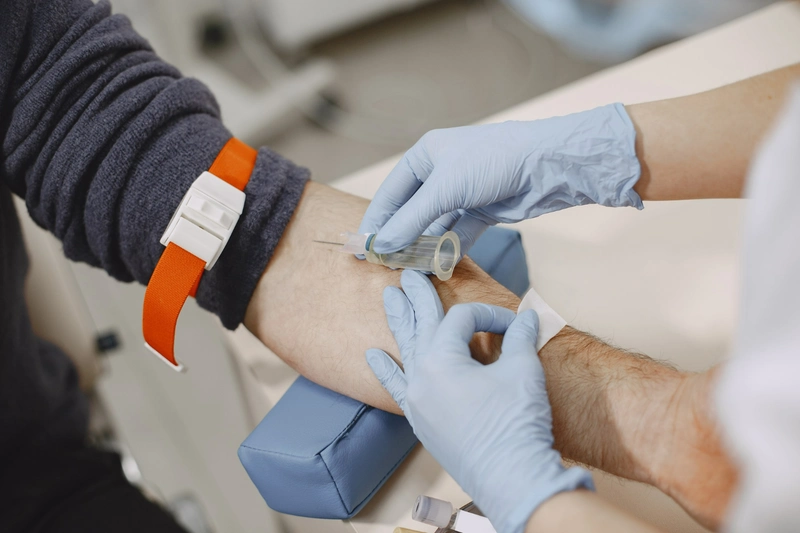Read Blog 
Home Sample Collection for Blood Tests: Convenience at Your Doorstep
In today’s fast-paced world, convenience has become a top priority. From groceries to medicines, everything can be delivered to your doorstep. So why should health checkups be any different? Home sample collection for blood tests is a modern solution that makes getting medical tests easier, faster, and more comfortable.
In this blog, we’ll discuss what home blood sample collection is, how it works, its benefits, and why more people are choosing it over traditional lab visits.
What is Home Sample Collection for Blood Tests?
Home sample collection is a service provided by diagnostic labs where a trained phlebotomist (a professional who draws blood) visits your home to collect your blood sample. You don’t have to travel, wait in lines, or spend time at a diagnostic center. Everything is done from the comfort of your home.
Once the sample is collected, it is taken to the lab for testing. The results are usually shared online or sent to you via email or SMS. It's that simple!
How Does It Work?
Here’s a step-by-step look at how home sample collection for blood tests usually works:
-
Booking an Appointment
You can book your test online through the lab's website or mobile app. Some labs also allow phone bookings.
-
Choose Your Test and Time
Select the blood test(s) you need and choose a date and time slot that suits you.
-
Phlebotomist Visit
A trained professional arrives at your location with all the necessary equipment. The process is hygienic and quick.
-
Sample Collection
The blood sample is collected safely and stored in sterile containers.
-
Lab Testing
The sample is transported to the lab where it is analyzed by professionals.
-
Get Your Results
Test reports are delivered digitally, usually within 24–48 hours, depending on the test.
Why Choose Home Sample Collection for Blood Tests?
Here are some major reasons why this service is gaining popularity:
1. Convenience
You don’t have to take time off work, drive to a lab, or wait in long queues. With home sample collection, everything happens at your doorstep.
2. Time-Saving
The entire process, from booking to sample collection, takes only a few minutes. It saves hours that would otherwise be spent traveling and waiting.
3. Ideal for the Elderly and Sick
For elderly people or those who are unwell, going to a diagnostic center can be stressful. Home sample collection makes it easier for them to get tested without leaving home.
4. Safe and Hygienic
Reputed labs follow strict hygiene and safety protocols. The equipment used is sterile, and phlebotomists are trained in safety standards.
5. Contactless and COVID-Safe
Especially during the pandemic, home testing became popular as a safer alternative. There’s minimal contact with others, reducing the risk of exposure.
6. Flexible Timings
Many labs offer early morning or late evening slots so you can choose a time that fits your routine.
Common Blood Tests You Can Book from Home
Most diagnostic centers offer a wide range of blood tests with home sample collection. Some common ones include:
-
Complete Blood Count (CBC)
-
Thyroid Profile
-
Lipid Profile
-
Liver Function Test (LFT)
-
Kidney Function Test (KFT)
-
Blood Sugar (Fasting/PP)
-
Vitamin D and B12
-
COVID-19 RT-PCR and Antibody tests
-
Pregnancy Tests
-
Hormone Panels
Whether it’s a basic health checkup or a specific test prescribed by your doctor, home collection is available for most types of blood tests.
Who Should Consider Home Sample Collection?
Home sample collection is suitable for:
-
Busy professionals with tight schedules
-
Elderly individuals with mobility issues
-
People with chronic illnesses needing regular tests
-
Parents with young children
-
Anyone recovering from surgery or illness
-
People avoiding exposure to infections or crowded places
Basically, if you value comfort, safety, and time, home sample collection is for you.
Tips for a Smooth Home Sample Collection Experience
To ensure everything goes smoothly, here are a few simple tips:
-
Fast if required: Some tests need you to fast for 8–12 hours. Follow the instructions shared during booking.
-
Stay hydrated: Drinking water before the test can make it easier to draw blood.
-
Keep your documents ready: Have your ID proof and doctor’s prescription (if needed) at hand.
-
Ask questions: Don’t hesitate to ask the phlebotomist about the process or safety measures.
Is Home Sample Collection Accurate?
Yes, absolutely! The accuracy of the test results does not depend on where the sample is collected. Labs maintain the same quality standards for home-collected and in-lab samples. The key is choosing a reliable and NABL-certified diagnostic center.
Cost of Home Blood Sample Collection
Most diagnostic labs offer this service at no extra charge, or for a small additional fee. Some even offer discounts for online bookings or health packages. The price may vary based on your location, the number of tests, and the lab.
Choosing the Right Diagnostic Lab
When booking a home collection, make sure to:
-
Check online reviews
-
Choose a NABL/ISO certified lab
-
Ensure they provide digital reports
-
Ask about safety and hygiene protocols
-
Compare prices for the best value
A good lab ensures timely service, reliable results, and professional handling of your health information.
Conclusion
With modern advancements in healthcare, convenience no longer has to come at the cost of quality. Home sample collection for blood tests is a safe, reliable, and time-saving way to take control of your health without stepping outside. Whether you’re managing a chronic condition, doing a routine checkup, or simply want peace of mind, this service offers a practical solution for everyone.
So, don’t wait for long queues or clinic appointments. Book your home sample collection for blood tests today and take the smart step toward better health—right from your home.










